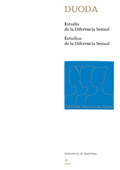Un fantasma abandona Europa: La crisis de la unidad
Article Sidebar

Main Article Content
Gemma del Olmo Campillo
For quite a long time a phenomenon has been developing in Europe that today has been made evident with the diverse protest movements that have arisen from people’s dissafectation with the political corruption and enormous inadequacies of the system. This phenomenon is the gradual rejection of the political forms belonging to the nineteenth century, where unity was sought in order to create a common front, a compact block, to achieve one same objective everywhere. But what was once useful for politics today does not seem to work, perhaps because of the abuse and the decadence of the political classes, the misuse of voters’ support, and the betrayal of their trust. What is clear is that there is a change in political forms that can be seen both in the social movements that have arisen out of the energy of the unhappiness and, in an earlier period, in the women’s movement. In both cases, the vitality of these movements lies in the absence of leaders and in their diversity - curiously, curiously, in what before was considered a weakness. Their strength comes, then, from direct contact with reality, with life and with the desires of those who make up these movements, without the pretension of cancelling out any of them; that is its strength.
Paraules clau
Crisis de la unidad, Política, Movimiento de mujeres, Vida, Europa, Corrupción política, Movimientos de protesta, Voto, Crisis of unity, Politics, Women’s movement, Life, Europe, Political corruption, Protest movements, Vote
Article Details
Com citar
Olmo Campillo, Gemma del. “Un fantasma abandona Europa: La crisis de la unidad”. DUODA: estudis de la diferència sexual, no. 41, pp. 16-25, https://raco.cat/index.php/DUODA/article/view/248256.
Drets
Drets d'autor
Els autors i les autores conserven els drets d’autoria i atorguen a Duoda el dret de primera publicació, a partir del qual l’obra serà disponible simultàniament sota una Llicència de Reconeixement-NoComercial-SenseObraDerivada (cc-by-nc-nd) que permet compartir l’obra amb tercers, sempre que aquests en reconeguin l’autoria i la publicació inicial en aquesta revista.
Articles més llegits del mateix autor/a
- Assumpta Bassas, María-Milagros , 1947- Rivera Garretas, Carmen Yago Alonso, Teresa Madrid Álvarez-Piñer, Laura Mercader Amigó, Gemma del Olmo Campillo, Elizabeth Uribe Pinillos, Ressenyes , DUODA: estudis de la diferència sexual: 2010: Núm.: 38
- Gemma del Olmo Campillo, La risa divina en la lengua materna , DUODA: estudis de la diferència sexual: 2008: Núm.: 34
- Gemma del Olmo Campillo, Ressenyes , DUODA: estudis de la diferència sexual: 2011: Núm.: 41
- María-Milagros , 1947- Rivera Garretas, Itziar González Virós, Remei Arnaus Morral, Maria-Josep Balsach i Peig, Gemma del Olmo Campillo, Berta Hernández García, Joana Masó Illamola, Ressenyes , DUODA: estudis de la diferència sexual: 2005: Núm.: 28
- Gemma del Olmo Campillo, Ressenyes , DUODA: estudis de la diferència sexual: 2010: Núm.: 39